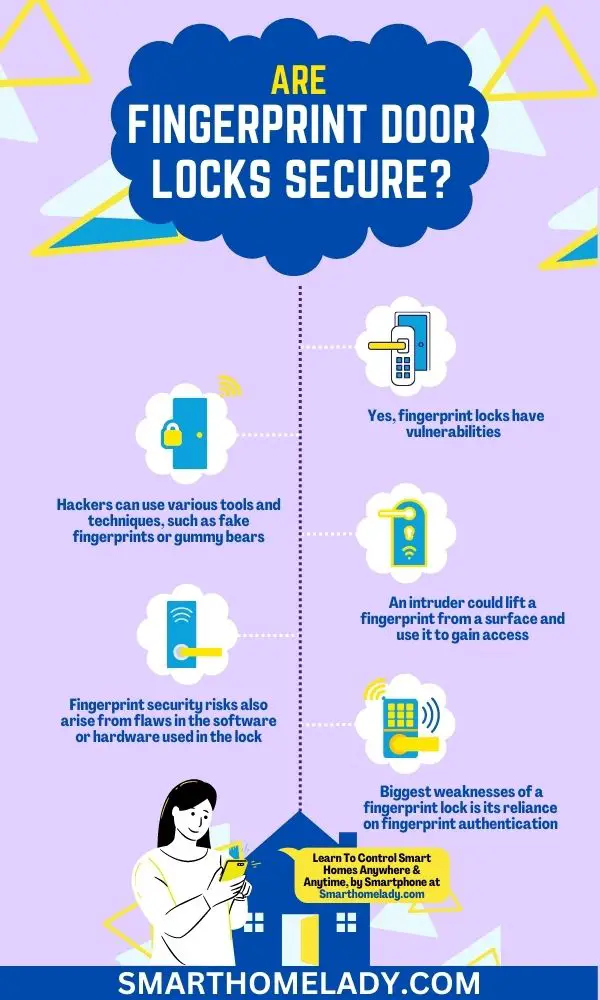Are you considering upgrading your home with a fingerprint door lock? While biometric technology has made significant advancements in recent years, it’s important to understand the true level of security these locks provide.
In this article, we will unmask the truth about fingerprint door locks and examine their vulnerability, durability, and convenience.
Firstly, you may wonder, “Are fingerprint door locks secure?” With reports of data breaches and cyber-attacks becoming more common, it’s natural to question the safety of your personal information.
We will explore if someone could bypass the biometrics and gain access to your property without authorization.

Contents
- 1 Can fingerprint door locks be hacked? Unveiling Vulnerability
- 2 How secure is a fingerprint lock? Putting Security to the Test
- 3 Can someone bypass fingerprint lock? Beyond the Biometrics
- 4 Is a fingerprint door lock worth it? Weighing the Pros and Cons
- 5 How do you pick a fingerprint door lock? Choosing Wisely
- 6 How many fingerprints can the fingerprint lock store? Limit of Fingerprints
- 7 How is the fingerprint door lock powered?
- 8 Can I unlock the fingerprint lock with a physical key?
- 9 How long can fingerprint door locks last?
- 10 Conclusion
Can fingerprint door locks be hacked? Unveiling Vulnerability
You may think that your fingerprint door lock is secure, but did you know that it can actually be hacked? Yes, fingerprint locks have vulnerabilities that make them susceptible to biometric hacking methods.
One of the biggest weaknesses of a fingerprint lock is its reliance on fingerprint authentication. Even though fingerprints are unique and difficult to replicate, fingerprint scanner weaknesses allow hackers to bypass the security system.
Hackers can use various tools and techniques, such as fake fingerprints or gummy bears, to trick the scanner into unlocking the door.
Additionally, fingerprint security risks also arise from flaws in the software or hardware used in the lock. While using a fingerprint door lock might seem like a convenient way to secure your home or office, it’s important to understand its limitations.
Despite being one of the most popular forms of biometric authentication, there are still possible ways for hackers to break through this form of security.
Therefore, it’s essential to consider additional measures such as using strong passwords or installing surveillance cameras for added protection against potential intruders.

How secure is a fingerprint lock? Putting Security to the Test
When it comes to testing the strength of biometric security measures, there are some surprising discoveries to be made. Fingerprint locks have been touted as a secure alternative to traditional locks, but they, too, have vulnerabilities that can compromise their security.
Biometric authentication flaws such as false positives and false negatives can lead to unauthorized access or denial of entry for legitimate users.
To understand the security risks of fingerprint locks, let’s take a closer look at the accuracy of fingerprint readers.
A study conducted by researchers at New York University found that many commercial fingerprint reader systems were vulnerable to spoofing attacks using fake fingerprints made from everyday materials like latex and silicone.
It means that an attacker could potentially bypass the lock by creating a replica of an authorized user’s fingerprint.
While fingerprint locks may seem convenient and futuristic, they may not always be the most secure option.
Alternative security measures such as PIN codes or two-factor authentication can provide an extra layer of protection against potential vulnerabilities in biometric security systems.
Can someone bypass fingerprint lock? Beyond the Biometrics
The short answer is yes. If you’re relying solely on biometric security measures, it’s important to consider that an attacker could potentially bypass your fingerprint lock using other methods, such as hacking into the system or stealing credentials.
Biometric locks are not foolproof and can be vulnerable to bypass techniques.
For instance, an intruder could lift a fingerprint from a surface and use it to gain access.
Another issue with biometric locks is false positives. These occur when the device incorrectly identifies someone as authorized because of similarities in their fingerprints.
Environmental factors like dirt, moisture, or dry skin can also affect accuracy and lead to false negatives where the device doesn’t recognize a legitimate user. User error is another factor that can compromise the security of biometric locks.
Inadvertently enrolling with unclean or damaged fingerprints or failing to follow proper enrollment procedures can result in failed authentication attempts.
While biometrics provides an additional layer of security, they should not be relied upon solely for securing valuable assets or sensitive information without supplementing them with other security measures like passwords, two-factor authentication, or physical keys.
Is a fingerprint door lock worth it? Weighing the Pros and Cons
Considering the advantages and disadvantages, it might be worth weighing your options before deciding on whether to invest in a biometric security system.
Fingerprint door locks have become increasingly popular due to their advanced security features. However, they also come with some concerns that need to be addressed before making a decision.
Following are some pros and cons of fingerprint door locks to assessing if a fingerprint door lock is worth it.
| Pros | Cons |
|---|---|
| Enhanced Security | Limited User Access |
| Keyless Entry | Costly Installation |
| Convenient for Users | Dependence on Power |
| No Need for Key Duplication | Difficult to Replace if Damaged |
| Can be Integrated with Smart Home Systems | False Rejection or Acceptance |
| Easy to Use | Risk of Biometric Data Theft |
| Durable and Long-lasting | Not Suitable for Every Environment |
Read More:
How do you pick a fingerprint door lock? Choosing Wisely
To make an informed decision on which biometric security system to invest in, it’s crucial to prioritize factors such as compatibility, reliability, ease of use, and installation process.
When choosing a fingerprint door lock, there are several criteria that you should consider before making your final purchase.
First and foremost, the installation process should be easy and straightforward. This means selecting a lock that is compatible with your current door setup and requires minimal modifications or additional hardware.
Another important factor to consider is maintenance requirements. You’ll want to choose a lock that is reliable and doesn’t require constant adjustments or repairs.

Look for models with high-quality components that can withstand heavy usage without breaking down or malfunctioning.
Additionally, be sure to read reviews from other users who have experience with the product to gauge its overall durability and longevity.
When selecting a fingerprint door lock, look for models with a user-friendly interface. These locks should be intuitive and easy to use so that anyone can operate them without difficulty.
Features like customizable access codes and remote control capabilities can also enhance the user experience while providing added security measures.
By prioritizing these factors in your search for the perfect fingerprint door lock, you can ensure that you’re investing in a product that will meet your needs both now and in the future.
| Choosing Criteria | Installation Process | Maintenance Requirements | Compatibility Issues |
|---|---|---|---|
| Durability | Easy & Straightforward | Reliable Components | Compatible with Door |
| User-Friendly | Minimal Modifications | Low Maintenance | Remote Control Capable |
| Customizable | No Additional Hardware | High-Quality Materials | Multiple Access Codes |
This table highlights key features of an ideal fingerprint door lock based on our criteria above. By using this table as a reference, you can easily compare different models and select the one that best meets your needs.
How many fingerprints can the fingerprint lock store? Limit of Fingerprints
If you’re like me and have a medium-sized family, it’s essential to know how many fingerprints your fingerprint lock can store.
Most modern fingerprint locks have a limit of fingerprints that they can store. This limit varies from one model to another and is determined by the storage capacity of the lock’s memory.
The storage capacity of a fingerprint lock determines how many fingerprints it can store. Some models can only store up to 10 fingerprints, while others can store up to 100 or more.
For instance, Eufy and Wyze smart locks have the ability to store 50 fingerprints.
It’s important to note that not all models allow for the same level of user management and access control. Therefore, before enrolling any additional users, it’s best to check the manufacturer’s guidelines on the enrollment process.
Example limits of fingerprints based on storage capacity
| Storage Capacity | Limit of Fingerprints |
|---|---|
| 10 | Small households |
| 50 | Medium-sized families |
| 100 | Large families |
Read More:
- Can Smart Locks Be Hacked?
- Are Smart Locks Waterproof?
- Can You Put A Smart Lock On Security Door?
- Do Smart Locks Need WiFi?
Frequently Asked Questions FAQs
How is the fingerprint door lock powered?
The most common way to power a fingerprint lock is through electrical wiring. This means that the lock is connected to your home’s electrical system and will always have a constant supply of power.
However, this type of power source can be unreliable during power outages or if there is an electrical fault.
To address this issue, many modern fingerprint door locks come equipped with backup options such as batteries or solar power sources. These backup options ensure that your lock stays functional even when there is no electricity available.
Battery life may vary depending on the model and usage frequency, so it’s important to keep track of battery levels and replace them as needed.
In addition to providing reliability during unexpected situations, opting for energy-efficient models can also help conserve energy and reduce your electricity bills over time.
Can I unlock the fingerprint lock with a physical key?
Yes, unlocking a fingerprint lock with a physical key is possible on some models, providing an alternative method for accessing your property or assets.
This keyless entry feature adds an additional layer of physical security to your home or office.
Knowing that you have the convenience factor of being able to use either your fingerprint or the physical key to access your belongings can bring peace of mind.
How long can fingerprint door locks last?
On average, fingerprint door locks can last up to 2-3 years before needing to be replaced or repaired. Of course, this timeframe can vary depending on usage and the quality of the product.
It’s important to regularly maintain and clean your fingerprint door lock to ensure its longevity.
Ultimately, investing in a high-quality fingerprint door lock can provide peace of mind and security for you and your loved ones for years to come.
Conclusion
In conclusion, the security of fingerprint door locks is a topic of much debate. While biometric technology offers a high level of convenience and ease of use, it also comes with its own set of vulnerabilities.
Hackers can potentially bypass these locks using various techniques such as fake fingerprints or even 3D printing.
However, that doesn’t mean all fingerprint door locks are insecure. It’s important to choose a reputable brand that employs robust encryption algorithms and has been independently tested for security flaws.
Additionally, it’s crucial to regularly update the firmware and keep the lock clean to prevent false positives.
If you’re considering investing in a fingerprint door lock, weigh the pros and cons carefully and choose wisely based on your specific needs and budget. With proper care and maintenance, these locks can offer reliable security for years to come.


